‘Time is money’ is an overused cliché, but the truism took centre stage as CFOs and senior finance experts from the manufacturing sector gathered in a round-table event recently, to debate on the challenges in the working capital cycle. Joyce Njeri reports.
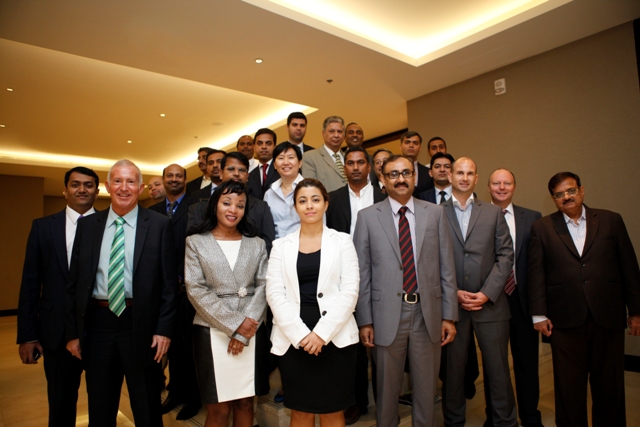
Accountant Middle East Editor Joyce Njeri and Citi Commercial Bank’s Shereen Abdulla (front 2nd left and 3rd respectively) join CFOs and Senior Finance experts from the manufacturing sector, during the recent roundtable event at the JW Marriott Marquis Hotel in Dubai.
THE 2008-2010 global financial crisis followed by the infamous ‘Arab Spring’ delivered a double-whammy thrashing to businesses in the region, leading to financial defaults, insolvencies, bankruptcies and increased risk of buyers defaulting on payments of goods purchased.
All the sectors of the global economy were largely affected; including the manufacturing, healthcare, hospitality, service sectors among others. This in turn forced many companies to take measures to guard against the risk of buyers defaulting on payments of goods purchased or services rendered, in order to ensure effective management of their working capital.
It is against this background that Accountant Middle East in conjunction with Citi Commercial Bank, took the initiative to address the challenges in the working capital cycle in the manufacturing sector, at a recent round-table event that brought together an influential group of Chief Financial Officer’s and Senior Finance professionals, in Dubai.
Survival of companies
The objective of the round-table was to look into ways of how companies could effectively manage their working capital cycle, by highlighting how the financing decisions determine a company’s overall working capital position and why the management of working capital is critical for the survival of companies in the manufacturing industry.
Paul Godfrey, CPI Media Group’s Senior Editor, was the moderator of the round-table discussions and started off the session by underlining the significant role that the manufacturing sector plays in the UAE’s economy.
“The UAE has a vibrant manufacturing segment,” Paul said, adding that the industry is “amongst the highest contributing sectors to the country’s non-oil GDP over the last decade.”
Statistics from the Dubai Chamber of Commerce and Industry show that last year, manufacturing exports accounted for 53 per cent of the UAE’s total non-oil exports of merchandise goods, and 22 per cent of total exports including oil exports. Manufactured exports from the country increased from $8.3 billion in 2000 to about $59.2 billion in 2012, registering a cumulative annual growth rate of about 18 per cent.
Effective cash flows
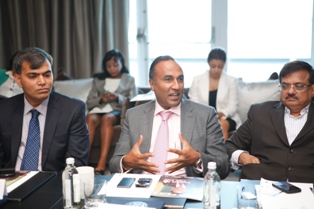
“The cash flow cycle is a crucially-important part of understanding how a business functions. Therefore, control of working capital is critical for the survival of the company, largely determined by the way it is managing its receivables, inventory and payables” – Vincent Valladares (centre), Citi Commercial Bank’s Managing Director and Middle East Head.
Post the global financial crisis, banks and other lending institutions have become more risk averse and are less willing to lend to companies if credit guarantees are not in place. On their part, companies have been putting measures into place to ensure effective cash flows in a cycle into, around and out of a business.
“The cash flow cycle is a crucially-important part of understanding how a business functions. Therefore, control of working capital is critical for the survival of the company, largely determined by the way it is managing its receivables, inventory and payables,” said Vincent Valladares, Citi Commercial Bank’s Managing Director and Middle East Head.
“In this regard, there’s an urgent need today than ever before, to address the challenges that the manufacturing sector is experiencing as far as the management of working capital is concerned,” he added.
Of fundamental importance is the source of finance for companies, as effective management guidelines to minimise the costs of funding working capital requirements largely depends on where you get your funds from, whether from savings, banks, angel investors, IPO flotation, and family… among others.
Citibank’s financial products
Among its broad range of financial products Citibank offers working capital solutions including overdraft facilities, term loans, syndications, trust receipt and short-term loans.
So, what are the main tests that companies face in the management of their working capital cycle?
The challenges mostly revolve around the administration and control of the working capital, ensuring that the company has enough cash, as this will save on bank interest and charges on overdraft, assuming that the company bought its inventories on credit.
One of the key topics that stood out strongly was the role that Trade Credit Insurance plays in the effective management of working capital.
When a company agrees to sell its goods or services on credit to a buyer, it automatically places itself at risk, and with economic conditions still unstable since the beginning of the global financial crisis in 2008, many companies are more and more taking insurance to mitigate the increasing risks of delayed payments or potential defaults.
Trade credit insurance
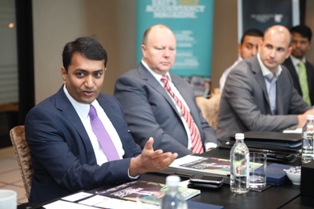
“The Middle East region is only a paltry 1.2% of the global trade credit insurance market, but the scenario is faster changing as more companies are now making informed credit decisions to minimise losses and expand into new markets” – Anand Nagaraj (left), Citi Commercial Bank’s Vice President and Head of Product Development.
Paul set off the stimulating session by expressing concern of how few companies made use of trade credit insurance in the past, but he added that this has significantly changed, particularly post the global financial crisis.
“Companies are resorting to insuring trade deals as availability of credit remains tight,” he said.
Anand Nagaraj, Citi Commercial Bank’s Vice President and Head of Product Development, added that the Middle East region is only a paltry 1.2% of the global trade credit insurance market, but the scenario is faster changing as more companies are now making informed credit decisions to minimise losses and expand into new markets.
The 2008-2010 global financial crisis led to high demand for trade credit insurance, structured to help protect businesses, financial institutions and traders against the consequences of defaults, insolvencies and bankruptcies of their trading partners, trade credit insurance has been a valuable tool for corporates.
This is supported by statistics from one of the region’s top provider of trade-related credit insurance solutions – Euler Hermes – which show that Euler Hermes experienced 54 per cent growth in its GCC portfolio last year, as more companies took measures to guard against the risk of default on trade payments by their buyers.
Double-digit growth
In the study, Euler Hermes said that demand for trade-related credit insurance in the GCC is expected to rise by nearly 40 per cent this year as companies seek to improve their ability to secure finance and cover risks in Europe, Africa and other markets.
“We have seen huge growth in the credit market in the region and the reason for this is that it’s an increased credit risk awareness that has come out from entrepreneurs,” it stated, adding that it expects a double-digit growth again in 2014, “which could be around 30 per cent.”
While supporting the role and benefits of trade credit insurance, Hubert Millasseau, the Finance Director of Goodyear Middle East revealed that indemnifying the giant tyre business has helped turn around the position of the company’s working capital.
“Goodyear Middle East works closely with Euler Hermes and this relationship has helped protect our business from non-payment of commercial debt,” Millasseau said.
“The Middle East has experienced a long period of restiveness in the last couple of years and there’s no doubt that this situation has affected businesses. The credit insurance has also proved beneficial as it allows companies to manage political risks of trade and makes sure that invoices are paid in time,” he added.
Role of factoring
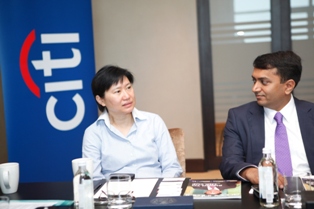
“The demand for corporate accountability has never been central like it is today, especially in public listed companies” – Wai Leng Low (left), the CFO of Dubai Precast LLC.
The process of authorising a third-party firm to pursue a client for debts, commonly known as factoring was also highlighted at the round table, with a number of participants revealing they use the services of factoring firms to help their businesses in maintaining short payment cycles for optimal.
“Slow payment has a crippling effect on business. If you don’t manage debtors, they will begin to manage your business,” said Ashit Sanghvi, the Financial Controller of Fikree Pipe LLC.
“Many businesses have cash flow that varies and therefore the benefits of factoring in helping with prompt payments, administration of sales invoicing, as well as helping in chasing up any slow payers cannot be gainsaid,” Ashit added.
The greatest nightmare for most financial managers is the exhaustion of liquid resources, as it can leave the firm unable to pay its maturing obligations as they come due.
This is echoed in a CFO study done by Deloitte which shows that in the last two years, CFO optimism plummeted to its lowest levels due to expectations for their operating cash flow.
CFO concerns over continued social upheaval and conflict unfolding, and how these events are affecting businesses, remain across the Middle East region.
“Delays in receipt of cash from sales can leave a firm without cash, despite overall profitability and therefore a company may want to depend on factoring to cover short falls in cash,” said Ashit.
Islamic financial industry
While explaining the effectiveness of factoring, Jaydeep Singh, the CFO of Fakhruddin Holdings said; “A company can have relatively large amount of working capital in one period, and relatively small in another period. Due to this variations, businesses find it necessary to use factoring to enable them to cover their short term cash needs in those periods in which these needs exceed the cash flow.”
“If a business is operating profitably, then it should generate cash surpluses. If it doesn’t generate surpluses, it risks running out of cash and this can leave the firm unable to pay its maturing obligations,” Jaydeep added.
Kevin Fairbotham, Head of Internal Audit, Ghanim Bin Saad & Sons Group Holdings asked about the dynamics of factoring in Islamic finance.
“The Islamic financial services industry, which are largely required to be Shariah compliant, needs a completely integrated approach to risk,” Anand said.
“Breaking any requirement of these stringent laws in the Shariah compliance chain is a big challenge in enterprise risk management, which dictate that no aspect of your financial management should be outside of Shariah,” he explained.
“Much of today’s business is conducted on credit. Islamic Shariah allows selling on credit as in murabaha, but there is still debate whether it allows the selling of debt,” Paul clarified.
“But why is there so much resistance to usage of factorers in this region?” Paul asked.
“Just like trade credit insurance, the concept of factoring is not clearly understood in this market,” Anand retorted.
Role of qualified CFOs
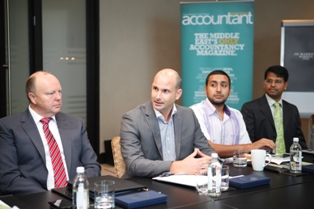
“The Middle East has experienced a long period of restiveness in the last couple of years and there’s no doubt that this situation has affected businesses. The credit insurance has proved beneficial as it allows companies to manage political risks of trade and makes sure that invoices are paid in time” – Hubert Millasseau (centre), Finance Director, Goodyear Middle East.
One topic though that generated intense debate was the role of role of qualified CFOs, accountants and key finance managers in determining how the financing and investment decisions are made.
“Effective cash management should be managed carefully to enhance the finance position of the company, and this calls for a strong team of many managers,” said Akhil Jain, Head of Finance at Danube Group Head.
“Purchasing initiates cash outflows and an over-zealous purchasing function can create liquidity problems,” he warned.
Bhupen Shah, Divisional Financial Controller of Jotun Paints, was of the view that finance managers are today required to “not only have good accounting judgments and prepare accurate financial statements, but are also expected to possess other additional skills that may not be written in their job description.”
His sentiments are echoed in a recent Deloitte study titled; ‘The Four Faces of a CFO’, where the authors highlighted reasons why there was a high turn-over of CFOs in the region, attributing it to factors such as the never ending pressure to cut costs, grow revenue and ensure control.
“The role of the CFO is under greater scrutiny, internally and externally. CFOs economic uncertainty, increased regulatory requirements, financial restatements and increased investor scrutiny have forced them into the spotlight. Given these factors, CFO turnover is on the rise,” the study states.
CFOs changing roles
The Deloitte study continues to say that today’s CFOs are expected to play four diverse and challenging roles. The two traditional roles are steward, preserving the assets of the organisation by minimising risk and getting the books right, and operator, running a tight finance operation that is efficient and effective. It also adds that it’s increasingly important for CFOs to be strategists, helping to shape overall strategy and direction, and catalysts, instilling a financial approach and mind set throughout the organisation to help other parts of the business perform better.
“These varied roles make a CFO’s job more complex than ever,” the study states.
The poor quality of financial reporting was thought to be a significant factor leading to the recent global stock market run-up, and therefore the role of corporate governance and best practices was also debated upon at the round-table.
“The demand for corporate accountability has never been central like it is today, especially in public listed companies,” said Wai Leng Low, the CFO of Dubai Precast LLC.
“With regards to allocation of finances, management of working capital and investments decisions, corporate governance provides the structure through which the objectives of the company are set including short-term and long-term business strategy and plans,” Wai added.
Corporate governance
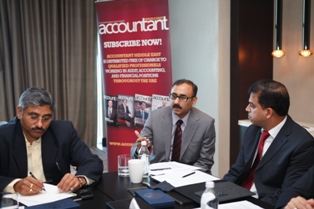
“If a business is operating profitably, then it should generate cash surpluses. If it doesn’t generate surpluses, it risks running out of cash and this can leave the firm unable to pay its maturing obligations,” Jaydeep Singh (centre), CFO, Fakhruddin Holdings
Citi Commercial Bank’s Anand Nagaraj emphasised the importance of the quality of corporate governance practices in companies, as “some of the guidelines draw attention to specific areas of corporate governance that are especially important for financial institutions like Citibank.”
“As a bank, we check out each customer thoroughly before we offer credit. Therefore, companies’ corporate governance guidelines, for instance in areas such as risk governance, help to maintain the confidence of those companies in the eyes of financial lenders, and may provide support in the event that they need short/long term funding,” Anand added.
The length of the working capital cycle is also determined by the investment of any excess liquid funds in marketable securities that provide the best return possible. At the round-table forum CFOs debated this under the topic ‘Seizing opportunities’.
“Cash kept in a safe will not generate a return and therefore a company can invest excess/surplus liquid funds in marketable securities that provide the best return possible, in order to achieve optimum cash levels,” said Muhammad Faisal Ali, Accounting Manager at Abaad Wood Industries.
Wrapping up the invigorating session Citi Commercial Bank’s Vincent Valladares enlightened on the efficient inventory management by using an age-old cliché, ‘Time is Money’.
“If you can get money to move faster around the cycle, then the business will need to borrow less money to fund the working capital as it will be generating more cash. Always remember that the two dimensions of working capital are ‘Time and Money’,” Vincent said.
Round-Table Participants
Wai Leng LOW, CFO, Dubai Precast LLC
Bhupen Shah, Divisional Financial Controller, Jotun
Hetal Popat, Finance Controller, Kemsol ME FZCO
Srinivas Rao, Accounts Manager, Anglo Gulf Ltd
Hubert Millasseau, Finance Director, Goodyear Middle East
Kevin Fairbotham, Head of Internal Audit, Ghanim Bin Saad & Sons Group Holdings
Ashit Sanghvi, Group Financial Controller, Fikree Pipe LLC
Akhil Jain, Group Head – Finance, Danube
Syed Hussain, Senior Financial Controller, Precious Metals FZC
Baby Pallipadan, CFO, Rawji Group
Nurani Sunder, Senior Finance Manager, Jotun Paints
Farhan Shaikh, Finance Manager, Ultratech World Engg
Muhammad Ali, Accounting Manager, Abaad Wood Industries
Nilantha Dissanayake, Finance Manager, Emaar International
Nassif Bazouzi, Group Finance Director, National Food Products Company
Mahmoud Mamdouh, Accountant, Emirates Dates Factory
Dharmendra Kumar, Senior Manager, Taghleef Industries
Mustafa A Vakhariya, Senior Financial Controller, Sprint S.C.C. LLC
Anand Nagaraj, Vice President, Head Product Development, Citi Commercial Bank
Vincent Valladares, Managing Director, Middle East Head, Citi Commercial Bank
Jaydeep Singh, CFO of Fakhruddin Holdings












